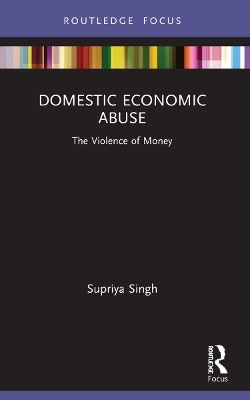
Domestic Economic Abuse
Routledge (Verlag)
978-1-032-01431-9 (ISBN)
Supriya Singh tells the stories of 12 Anglo-Celtic and Indian women in Australia who survived economic abuse. She describes the lived experience of coercive control underlying economic abuse across cultures.
Each story shows how the woman was trapped and lost her freedom because her husband denied her money, appropriated her assets and sabotaged her ability to be in paid work. These stories are about silence, shame and embarrassment that this could happen despite professional and graduate education. Some of the women were the main earners in their household. Women spoke of being afraid, of trying to leave, of losing their sense of self. Many suffered physical and mental ill-health, not knowing what would trigger the violence. Some attempted suicide. None of the women fully realised they were suffering family violence through economic abuse, whilst it was happening to them.
The stories of Anglo-Celtic and Indian women show economic abuse is not associated with a specific system of money management and control. It is when the morality of money is betrayed that control becomes coercive. Money as a medium of care then becomes a medium of abuse.
The women’s stories demonstrate the importance of talking about money and relationships with future partners, across life stages and with their sons and daughters. The women saw this as an essential step for preventing and lessening economic abuse.
A vital read for scholars of domestic abuse and family violence that will also be valuable for sociologists of money.
Supriya Singh is a sociologist of money, migration and family. She is Honorary Professor at the Graduate School of Business and Law, Royal Melbourne Institute of Technology (RMIT) University.
1 Introduction: Economic abuse is the untold story of family violence
2 Carol: The joint account becomes a medium of abuse
3 Ekta: The ‘good son’ sends her money to his parents
4 Rina: Dowry is economic, emotional and physical abuse
5 Geeta: He gave me coins, not notes
6 Karen: ‘I’ve been a single mother for most of my married life’
7 Asha: ‘You now belong to my family and your money is mine’
8 Chitra: He and his family abused her for she did not behave ‘like a good wife’
9 Prema: He married her to get permanent residence
10 Betty: After he died she recognised it as economic abuse
11 Heer: She knew she should leave but was in a silent ‘cultural bind’
12 Bala: A story of torture, survival and empowerment
13 Enid: Talking of money
14 Conclusion
| Erscheinungsdatum | 06.08.2021 |
|---|---|
| Reihe/Serie | Routledge Advances in Sociology |
| Verlagsort | London |
| Sprache | englisch |
| Maße | 138 x 216 mm |
| Gewicht | 163 g |
| Themenwelt | Sachbuch/Ratgeber ► Beruf / Finanzen / Recht / Wirtschaft ► Geld / Bank / Börse |
| Sachbuch/Ratgeber ► Gesundheit / Leben / Psychologie ► Familie / Erziehung | |
| Sachbuch/Ratgeber ► Gesundheit / Leben / Psychologie ► Lebenshilfe / Lebensführung | |
| Sachbuch/Ratgeber ► Gesundheit / Leben / Psychologie ► Psychologie | |
| Recht / Steuern ► Arbeits- / Sozialrecht ► Sozialrecht | |
| Recht / Steuern ► EU / Internationales Recht | |
| Recht / Steuern ► Privatrecht / Bürgerliches Recht ► Familienrecht | |
| Sozialwissenschaften ► Soziologie ► Mikrosoziologie | |
| ISBN-10 | 1-032-01431-8 / 1032014318 |
| ISBN-13 | 978-1-032-01431-9 / 9781032014319 |
| Zustand | Neuware |
| Informationen gemäß Produktsicherheitsverordnung (GPSR) | |
| Haben Sie eine Frage zum Produkt? |
aus dem Bereich


